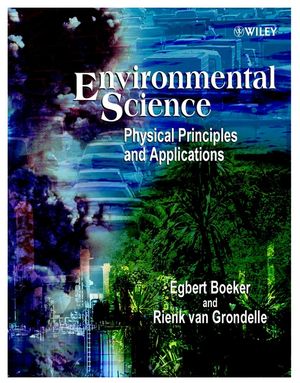Environmental Science: Physical Principles and ApplicationsISBN: 978-0-471-49577-2
Paperback
378 pages
November 2001
 This is a Print-on-Demand title. It will be printed specifically to fill your order. Please allow an additional 15-20 days delivery time. The book is not returnable.
|
||||||
Preface
Acknowledgements
1. Introduction: A Physical Approach to Environmental Problems
What are Environmental Problems -
Pollution
The Economic and Social Context
Sunlight and the Solar Spectrum
The Greenhouse Effect
Transport of Pollutants
The Carbon Cycle
2. Weather and Climate
Energy Transport
The Atmsophere, Vertical Structure and Motion
Horizontal Motion of Air
The Oceans
3. Climate Change
Natural Changes of Climate
Human induced changes
Consequences of Climate Change
Reactions to Climate Change
4. Conventional Energy
Physics of Heat
Heat and Power: Thermodynamics
Converting Heat into Power: Problems and 'Solutions'
5. Carbonfree Energies
Renewable energies
Nuclear Power
6. Making up the Balance
Greenhouse Gases, Pollution and Resources
Defining the task
7. Transport of Pollutants
Basic Concepts
Dispersion in the Air
Dispersion in Surface Waters
Dispersion by Groundwater
8. Noise
Physics of Sound
Human hearing
Reducing Sound Levels
9. Environmental Spectroscopy
Basic Spectrospcopy
The Solar Spectrum at Ground Level
Experimental Techniques in Environmental Spectroscopy
Solar UV, Ozone and Life
10. Geophysical Methods
Radioactive Clocks
Isotope Ratios as Environmental Sensors
Magnetic Surveys
Seismic Probing
11. Science and Society
Finite Resources of Energy
Pollution and Health Effects
Environmental Policy
Thinijhng about the Environment and Human Life
The Responsibility of the Scientist
Appendices
References
Index
Acknowledgements
1. Introduction: A Physical Approach to Environmental Problems
What are Environmental Problems -
Pollution
The Economic and Social Context
Sunlight and the Solar Spectrum
The Greenhouse Effect
Transport of Pollutants
The Carbon Cycle
2. Weather and Climate
Energy Transport
The Atmsophere, Vertical Structure and Motion
Horizontal Motion of Air
The Oceans
3. Climate Change
Natural Changes of Climate
Human induced changes
Consequences of Climate Change
Reactions to Climate Change
4. Conventional Energy
Physics of Heat
Heat and Power: Thermodynamics
Converting Heat into Power: Problems and 'Solutions'
5. Carbonfree Energies
Renewable energies
Nuclear Power
6. Making up the Balance
Greenhouse Gases, Pollution and Resources
Defining the task
7. Transport of Pollutants
Basic Concepts
Dispersion in the Air
Dispersion in Surface Waters
Dispersion by Groundwater
8. Noise
Physics of Sound
Human hearing
Reducing Sound Levels
9. Environmental Spectroscopy
Basic Spectrospcopy
The Solar Spectrum at Ground Level
Experimental Techniques in Environmental Spectroscopy
Solar UV, Ozone and Life
10. Geophysical Methods
Radioactive Clocks
Isotope Ratios as Environmental Sensors
Magnetic Surveys
Seismic Probing
11. Science and Society
Finite Resources of Energy
Pollution and Health Effects
Environmental Policy
Thinijhng about the Environment and Human Life
The Responsibility of the Scientist
Appendices
References
Index



